Our Impact
EFI is Driving Change Across Agricultural Systems in the Americas
After five years operating as an independent nonprofit, EFI is producing positive impacts across agricultural systems in four countries. Recent third-party evaluation studies have found that EFI is:
- Driving improved business performance for growers with documented ROI.
- Generating wage bonuses (more than $6 million in EFI’s first four years).
- Improving working conditions.
- Creating higher levels of assurance for retailers and consumers.
- Creating systemic change through collective impact.
Measuring Impact
Although we are early in our organizational development, we have invested in processes to record and measure how our work is meeting impact theory and driving value for all participants in the supply chain and will continue to report measurable outcomes from supply chain improvements.
While our footprint is small, the results on farms have been pervasive, and we are positioned to scale our model and improve the lives of hundreds of thousands of farmworkers throughout the Americas while transforming the food supply chain.
Theory of Change
EFI is a non-profit social enterprise to transform agriculture through farmworker engagement. We believe that if the workforce is properly trained and incentivized to collaborate with management in developing a safe, stable and dignified working environment, then new value is created for growers and buyers.
EFI's Reach & Impact
89
CERTIFICATIONS COMPLETED
60,000
FARMWORKERS WORKING ON FARMS WITH EFI-TRAINED LEADERSHIP TEAMS
$25 MILLIONS
GENERATED IN WORKER BONUSES
Program Impact Areas
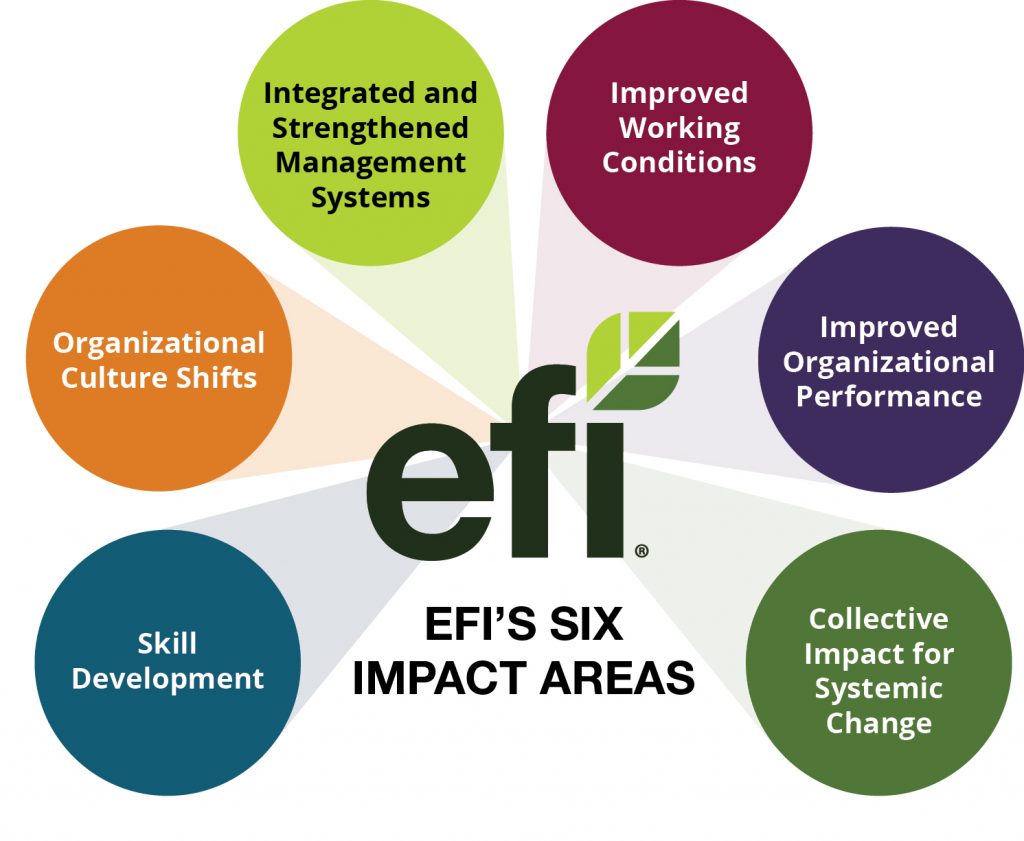
Evaluation Studies
- Equitable Food Initiative Impact Evaluation Report, BSD Consulting, November 2019.
- Impact Evaluation 2016, Kenton Harmer, Certification & Impact Director, February 2017.
- Making the Business Case for Improved Farm Labor Conditions: Evaluating the Equitable Food Initiative Leadership Teams Model, Christy Getz & Ron Strochlic, March 2017.
- Agricultural workers’ participation in certification as a mechanism for improving working conditions: The Equitable Food Initiative, Journal of Applied Communication Research. Heather Zoller, Ron Strochlic & Christy Getz, 2019.
Positive Outcomes Result From Engaging Workers
EFI’s unparalleled approach in the fresh produce industry creates a worker engagement model that leads to a variety of positive outcomes that intersect and reinforce one another.
An investment in developing workers’ soft skills and the systems to engage them leads to advances in organizational culture and management systems.
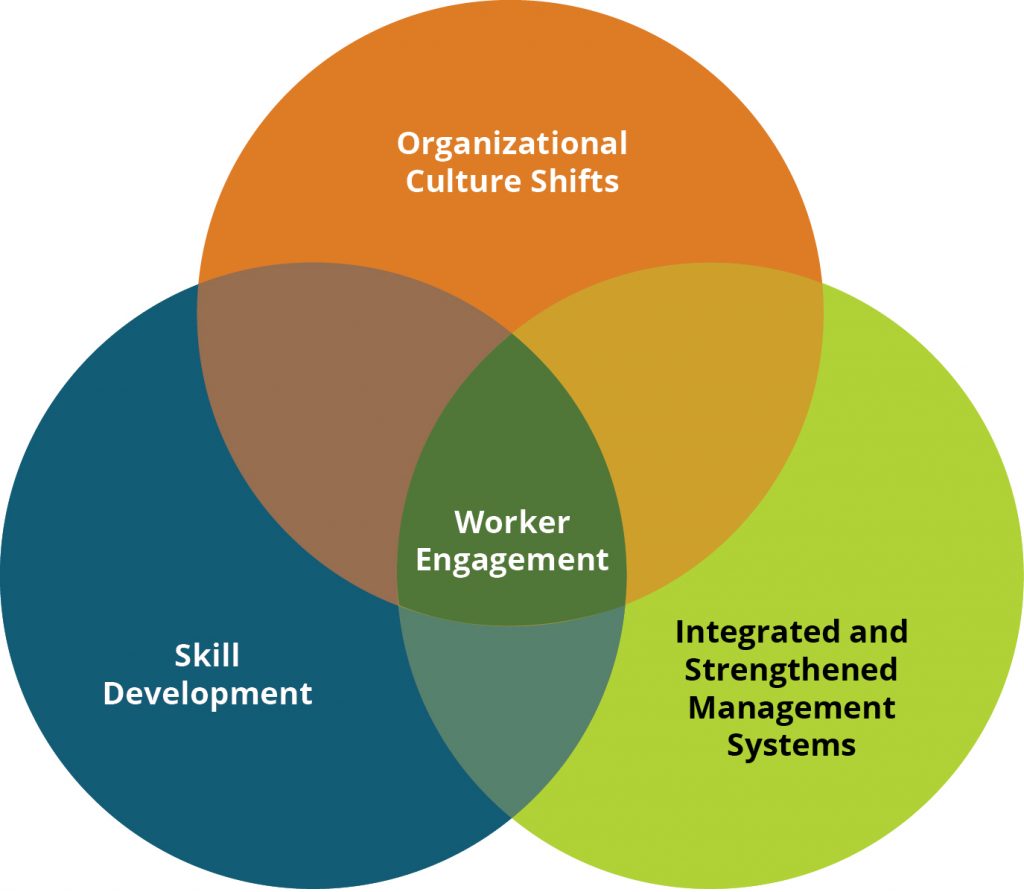
Impact Area: Skills Development
EFI’s workforce development facilitators provide a minimum of 40 hours of training to Leadership Teams on effective problem-solving processes, data gathering, communication and conflict resolution. Facilitators use a popular education model for the training, which provides transformative and relevant experiences. It is often the first training or professional development opportunity farmworkers have experienced.
The soft skills taught as part of the EFI training – including listening, brainstorming and empathy – shift the way workers and managers approach one another and ultimately lead to collaborative work environments.
Developed Skills Most Often Cited by EFI-Trained Workers and Managers
| Self Confidence and Agency |
Increased confidence in abilities evolves to a sense of agency with the capacity and desire to collaborate as a team. |
| Empathy and Active Listening |
Active listening and the capacity to share, understand and respect another’s perspective changes management approaches and the work environment. |
| Communication |
Ability and opportunities for communication increase, and enhanced skills allow for effective worker engagement. |
| Teamwork and Problem-Solving |
Leadership Team members collaborate to identify issues and root causes, brainstorm solutions, assess situations and define plans. |
The EFI Leadership Team training develops mindsets, attitudes, behaviors and capacities for effective leadership, teamwork and problem-solving.


Impact Area: Organizational Culture Shifts
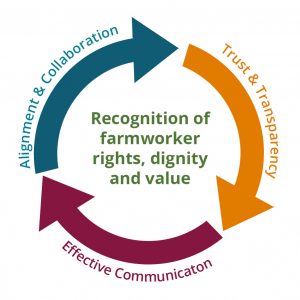 The EFI Program advances profound self-reinforcing culture shifts in grower organizations, leading to a collaborative and respectful work environment, an engaged workforce and stronger relationships based on effective communication, trust and transparency.
The EFI Program advances profound self-reinforcing culture shifts in grower organizations, leading to a collaborative and respectful work environment, an engaged workforce and stronger relationships based on effective communication, trust and transparency.
As a deeper understanding and value is placed on worker rights, trust and transparency are fostered. Meanwhile, participation in EFI Leadership Teams strengthens interpersonal relationships. Both workers and managers cite the removal of fears and language barriers and report new engagement from workers who are encouraged to speak up to share problems and ideas.
These outcomes of the EFI Program – increased trust, transparency, more effective communication and interpersonal relationships – allow a collaborative and respectful work environment to flourish. Both managers and workers have an increased sense of belonging and commitment to the organization. There is a shared purpose, and the “us versus them” mentality is replaced with a continuous improvement approach.
Impact Area: Integrated & Strengthened Management Systems
Growers in the EFI Program report improvements in their management systems, performance indicators and organizational culture and cite the following examples:
- Managers can act sooner and with a deeper understanding of challenges and possibilities enriched by worker input and perspectives.
- Managers recognize the importance of learning more about other areas of the operation and begin making links across different practices and disciplines.
- Because departmental managers are all in the same room (often for the first time), they create a more integrated management approach from their previously fragmented systems.
- Areas are identified where formal procedures are absent but needed, and robust policies and processes are put in place.
- Meeting standards for working conditions, food safety and pest management become shared goals among all areas of the organization, not resting responsibility on one person or department.
- Worker representatives have the opportunity to enrich and discuss improvement plans with management, peers and supervisors.
- Ownership by workers across levels and departments increases around crucial issues. Systems improve, while the program reduced risks.
- Issues that have been pending, or have been identified but not solved, are being handled with quicker response times by EFI Leadership Teams.
We have had systems for quality and food safety management for a long time. The difference in EFI has been marked by worker engagement. How to do it better? EFI focuses on that through more knowledge, more engagement and better risk management.
--- Manager Interviewed for Research Study
Impact Area: Improved Working Conditions
The EFI model creates systems-level change that improves working conditions through a variety of factors. In addition to the cultural shifts around trust, communication and collaboration, overall working conditions are improved as Leadership Teams address specific issues. Corrective action plans, created during third-party audits of EFI Standards, direct more attention and resources to improving conditions and preventing workplace incidents.
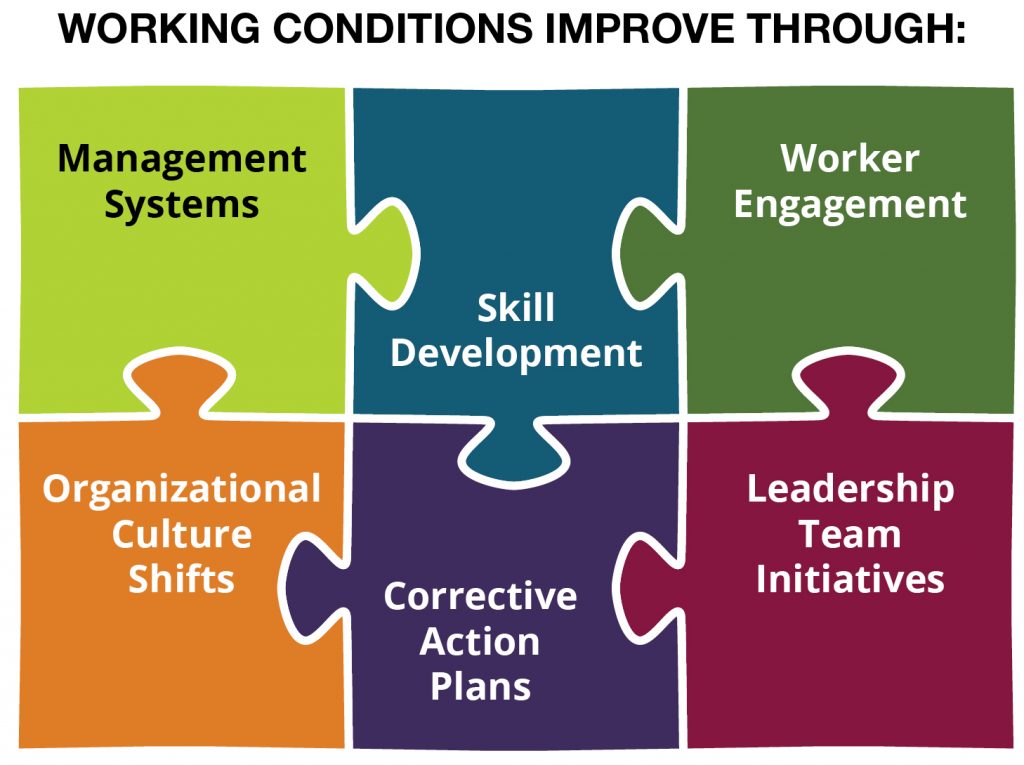
Before I didn’t dare to speak up. Now I can, without being afraid. I don’t feel embarrassed any more. I didn’t have confidence in myself, but I learned from the trainings. The [EFI Leadership Team] gives me the opportunity to grow and take on more challenges. When we first arrived from Veracruz I felt strange. We speak a dialect and Spanish. In the committee, I started getting to know my coworkers – we felt welcome.
--- Male Farmworker
Impact Area: Improved Organizational Performance
EFI has helped us maximize our efficiencies in all aspects of our program and work areas. The EFI model gave workers a voice and a way to share their ideas. It helped us work together to implement improvements, taking an efficient operation and making it even better.
--- Shawn Hartley, Owner and Vice President, Onions 52
When the EFI Program is introduced to farming operations, the goal is to create a commitment to continuous improvement and lean management that leads to innovation and improved organizational performance.
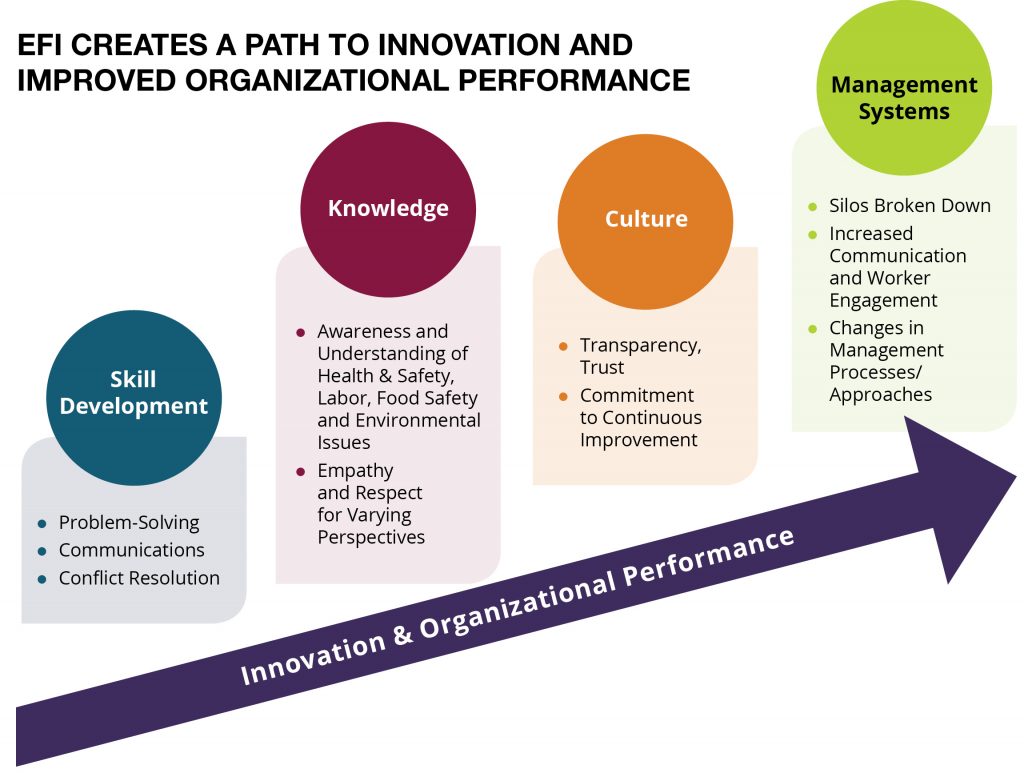
Impact Area: Collective Impact of Systemic Change
EFI has succeeded in forming vibrant and unique partnerships across businesses and organizations representing diverse interests in the fresh produce value chain. Having agreed to a common objective represented by the EFI Standards, the multistakeholder group has a strong shared purpose to protect farmworkers, consumers, future generations and the long-term viability of the fresh produce industry.
Representing the various interests of stakeholders throughout the fresh produce supply chain, EFI has effectively become a backbone organization for collective impact, providing the framework to enact the shared vision and common agenda of the group.


